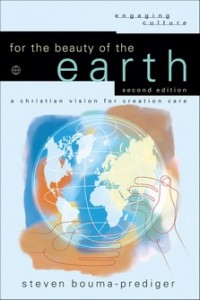 In the previous post, I reviewed part of Steven Bouma-Prediger’s book For the Beauty of the Earth: a Christian vision for creation care. We noted that, at some level, “authentic Christian faith requires ecological obedience.” Obstacles to that obedience can include incorrect theology, lack of value, indifference in discipleship. Bouma-Prediger underscored both theology and value: “We care for only what we love. We love only what we know. We truly know only what we experience.”
In the previous post, I reviewed part of Steven Bouma-Prediger’s book For the Beauty of the Earth: a Christian vision for creation care. We noted that, at some level, “authentic Christian faith requires ecological obedience.” Obstacles to that obedience can include incorrect theology, lack of value, indifference in discipleship. Bouma-Prediger underscored both theology and value: “We care for only what we love. We love only what we know. We truly know only what we experience.”
Jesus Died for Creation
“Put the Bible on the shelf for a couple decades”, that’s what Thomas Berry suggests as the way forward. However, Bouma-Prediger unpacks a robust, concise biblical theology of creation as the rationale for creation care in chapter four. His close reading of Genesis, Job, and Colossians reveals the inherent goodness of creation contra the anti-material impulse of evangelical faith. Noting God’s covenant with creation, the God-centered Creator theme in Job, and Christ as agent, redeemer, and lord of creation, the Scriptural weight moves the reader to repentance over a low view of creation and into a high view of God’s good and broken world. After all, Jesus reconciles all things on heaven and on earth “by the blood of his cross” (Col 1:20). In short, ecology or environmental discipleship is a gospel issue because Jesus died to reconcile and heal creation and offer it back to the Creator. Offering a balanced reflection on our responsibility to care for the earth, he writes:
It is a false to claim that concern for the earth is not legitimate feature of authentic Christian discipleship as it is to claim that care for the earth is the sum total of what it means to be a disciple of Christ.
Alternative Environmental Ethics
Pressing into the nuances of ecological ethics, the author present a case based on systematic theology, followed by an examination of faulty motivations for eco-ethics. He exposes the wisdom, folly and idolatry associated with the following views: Conservationist Movement (too anthropocentric), Rights of Future Generations (appeals to morality and justice), Animal Rights (not ecocentric), Biocentrism (life-centered not God-centered), Wilderness Movement (displaces humanity), Land Ethic (learn to think like a mountain, insightful but limited) & Deep Ecology, which acknowledges the intrinsic moral value of the natural world (this puts humans and all biotic life on the same plane).
Who You Are Not What You Do?
Interestingly, the author finishes out the book and his case by arguing for “the kind of people we ought to be” not what kind of things we should do. While this virtue driven ethic has great merit, it leaves the reader hanging. How should I act on these values? Where do I start? Recycling, eco-tours, political action, animal rights? For those conversant in Ethics, he focuses on arteology not teleology, virtue not ultimate purpose. Of course, ultimate purpose should inform our values. If the future of this world is a renewed creation, then it follows that we should care about the present creation.
He prescribes a set of values that are endemic to Christian character and essential in environmental discipleship. Since creation has integrity and value, we owe it respect and receptivity. Since the earth is finite, we must exercise the virtues of self-restraint ad frugality, not exploiting the earth and living within our means. The earth is fruitful; therefore, we must sustain its fruitufulness. You get the drift. A fresh look at creation care, indeed. The author holds up the pure value of being a certain kind of disciple, rather like Christ, and allowing those values to address God’s creation. If we are true to who we are in Christ, we will care for the earth out of Christlike character. Striking. Convicting.
Evaluation of the Book
By keeping his case close to Scripture, Bouma-Prediger forces conservative Evangelicals to reconsider their anti-environmental or apathetic view of creation. The case is also made close to Christ, being a certain kind of consistent disciple. It’s a challenge to extend Christian obedience into all realms, not just areas of familiar morality. Well-written and informed, this book deserves a place on your shelf. However, a companion volume on practical environmental discipleship will also be necessary, something that the author does not provide.
